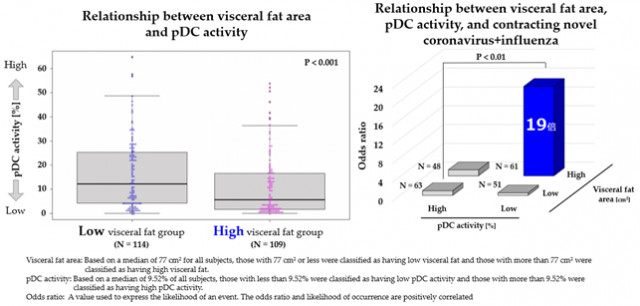Japan’s First Discovery*1 on Visceral Fat and Immune Activity in Joint Research by Kirin Holdings and Kao
Joint Research Results (Summary) (Graphic: Business Wire)
TOKYO--(뉴스와이어)--Kirin Holdings Company, Limited (TOKYO:2503) and Kao Corporation (TOKYO:4452) will participate in the Wakayama Health Promotion Study, a cohort study*2 led by Wakayama Medical University and organized by the Health Promotion Research Center (HPRC), a non-profit organization. Kao and Kirin Holdings conducted a joint study from November 2022 to investigate the relationship between visceral fat and the plasmacytoid dendritic cells (pDC*3) activity*4, which are the command center for immunity.
In recent years, attention has focused on the relationship between obesity and immunity, as it has been reported that obesity leads to more severe viral infections*5. This study was the first in Japan*1 to investigate the relationship between visceral fat and immune activity and confirm that high visceral fat levels are associated with low pDC activity (low immune function) and that high visceral fat levels and low pDC activity are associated with a high risk of contracting novel coronavirus infection and influenza. These findings have not yet been reported in any paper in the world*6. The results will be presented at the 44th Annual Meeting of the Japan Society for the Study of Obesity and the 41st Annual Meeting of the Japanese Society for Treatment of Obesity, which will be held in Miyagi Prefecture, on November 25 (Sat.) and 26 (Sun.), 2023.
*1 Based on article and abstract information published in Pubmed and the Journal of Health Care and Society Web (as of November 22, 2023, according to KnowledgeWire)
*2 One of the observational research methods in analytical epidemiology. By creating groups involved in specific disease factors and uninvolved groups, and calculating the incidence rate of the target disease within each group, it is possible to examine the relation between the disease factors and the onset.
*3 An immune cell that plays an important role as a command post when bacteria or viruses enter the body. Activation of pDC activates various immune cells such as NK cells, T cells, and B cells to protect against viral infection.
*4 Percentage of pDCs producing antiviral factors upon stimulation that mimics viral infection
*5 Ghilotti F et al. J Epidemiol. 2019; 48(6): 1783-1794.
Popkin BM et al. Obes Rev. 2020; 21(11): e13128.
*6 Based on article information published in Pubmed and the Journal of Health Care and Society Web (as of November 22, 2023, according to KnowledgeWire)
Joint Research Results (Summary)
Japan’s First Discovery*1
(1) Lower pDC activity was observed in individuals with high visceral fat.
(2) A higher percentage of people with high visceral fat and low pDC activity had contracted novel coronavirus infection and influenza compared to those who did not.
Implications Obtained
It is suggested that maintaining low visceral fat mass and high pDC activity is associated with a reduced risk of contracting novel coronavirus infection and influenza.
Joint Research Results
- Background and Objectives
Obesity is defined by the World Health Organization (WHO) as “a condition of increased health risk due to abnormal or excessive fat accumulation” and is associated with an increased risk of chronic diseases. The effects of obesity on health have been studied in many countries. In recent years, the relationship between obesity and immunity has been attracting attention, as it has been reported that obesity leads to more severe viral infections*7.
This research was conducted as part of the Wakayama Health Promotion Study, which has targeted residents of Wakayama Prefecture since 2011. Kao, which has long been involved in research on visceral fat obesity, which is considered closely related to lifestyle-related diseases, and Kirin Holdings, which has been conducting research in the field of immunology for over 35 years, collaborated to clarify the relationship between visceral fat and pDC activity.
*7 Pranata R et al. Clin Nutr ESPEN. 2021; 43: 163-168.
- What is the Wakayama Health Promotion Study?
This is a cohort study led by Wakayama Medical University since 2011 which is currently being conducted in collaboration with HPRC, to identify genetic and environmental factors involved in the development of various diseases among local residents in Wakayama Prefecture.
Much research has been done in the program to date on lifestyle, lifestyle-related diseases, and muscle mass, resulting in many findings including the relationship between loss of muscle mass and the development of atherosclerosis and the relationship between a history of falls and voluntary physical activity. This was the first time the program conducted research into the immune function.
Through the Wakayama Health Promotion Study, Kirin Holdings and Kao are working to clarify the relationship between visceral fat mass and pDC activity in an effort to reduce health risks for consumers in the future.
- Research Methods
In November 2022, specific checkups were conducted in Wakayama Prefecture of 223 residents aged 50-55. From this, Kao obtained data on lifestyle habits and visceral fat area, while Kirin measured data on pDC activity in the blood. These data were shared among the two teams, and the relationship between visceral fat and pDC activity was jointly studied and analyzed. The groups studied were divided as follows.
Visceral fat area: Based on a median value of 77 cm2 for all subjects, those with visceral fat less than 77 cm2 were defined as the low visceral fat group, and those with visceral fat greater than 77 cm2 as the high visceral fat group.
pDC activity: Based on a median value of 9.52% for all subjects, those with pDC activity of 9.52% or less were defined as the low pDC activity group, and those with pDC activity of 9.52% or more were defined as the high pDC activity group.
- Results
Result 1: Relationship between visceral fat area and pDC activity
The group with higher visceral fat area values had significantly lower pDC activity than the group with lower visceral fat area values (Figure 1).
Result 2: Effect of visceral fat area and pDC activity on the contracting of infectious diseases
The group with high visceral fat area values had a higher incidence of novel coronavirus infection than the group with low values, with a 7-fold higher odds ratio*8. Meanwhile, the group with low pDC activity had a higher incidence of novel coronavirus infection than the group with high pDC activity, with a 5-fold higher odds ratio (Figure 2).
The analysis was also divided into four groups to confirm the synergistic effect of high or low visceral fat area and pDC activity and found that the group with high visceral fat area and low pDC activity had a higher incidence of novel coronavirus infection than the group with low visceral fat area and high pDC activity, with a 20-fold higher odds ratio. Similar results were observed with influenza (Figure 3).
*8 The odds ratio is a value used to express the likelihood of an event. The odds ratio and likelihood of occurrence are positively correlated.
- Collaborative Research Results
For the first time in the world, this collaboration found that people with high visceral fat area levels had low pDC activity. It was also suggested that visceral fat area and pDC activity, respectively, affect susceptibility to novel coronavirus infection and influenza, and that people with high visceral fat area and low pDC activity are particularly susceptible to these diseases.
Thus, it can be said that it is important for people with high visceral fat area values and low pDC activity to address both visceral fat mass and immune function.
About Kirin Holdings
Kirin Holdings Company, Limited is an international company that operates in the Food & Beverages domain (Food & Beverages businesses), Pharmaceuticals domain (Pharmaceuticals businesses), and Health Science domain (Health Science business), both in Japan and across the globe.
Kirin Holdings can trace its roots to Japan Brewery which was established in 1885. Japan Brewery became Kirin Brewery in 1907. Since then, the company expanded its business with fermentation and biotechnology as its core technologies, and entered the pharmaceutical business in the 1980s, all of which continue to be global growth centers. In 2007, Kirin Holdings was established as a pure holding company and is currently focusing on boosting its Health Science domain.
Under the Kirin Group Vision 2027 (KV 2027), a long-term management plan launched in 2019, the Kirin Group aims to become A global leader in CSV*9, creating value across our world of Food & Beverages to Pharmaceuticals. Going forward, the Kirin Group will continue to leverage its strengths to create both social and economic value through its businesses, with the aim of achieving sustainable growth in corporate value.
*9 Creating Shared Value: combined added value for consumers as well as for society at large.
About Kao Corporation
Kao creates high-value-added products and services that provide care and enrichment for the life of all people and the planet. Through its portfolio of over 20 leading brands such as Attack, Bioré, Goldwell, Jergens, John Frieda, Kanebo, Laurier, Merries, and Molton Brown, Kao is part of the everyday lives of people in Asia, Oceania, North America, and Europe. Combined with its chemical business, which contributes to a wide range of industries, Kao generates about 1,420 billion yen in annual sales. Kao employs about 33,500 people worldwide and has 135 years of history in innovation. Please visit the Kao Group website for updated information. https://www.kao.com/global/en/
Kao established its ESG strategy, the Kirei Lifestyle Plan in April 2019. From 2021, Kao is promoting its Mid-term Plan which declares “protecting future lives” and promoting “sustainability as the only path” as its vision. Kao will continue to integrate ESG perspectives into its company management, aiming to develop its business and provide better products and services to consumers and society, and work toward its purpose, “To Realize a Kirei World in Which All Life Lives in Harmony.”
View source version on businesswire.com: https://www.businesswire.com/news/home/20231124408768/en/



